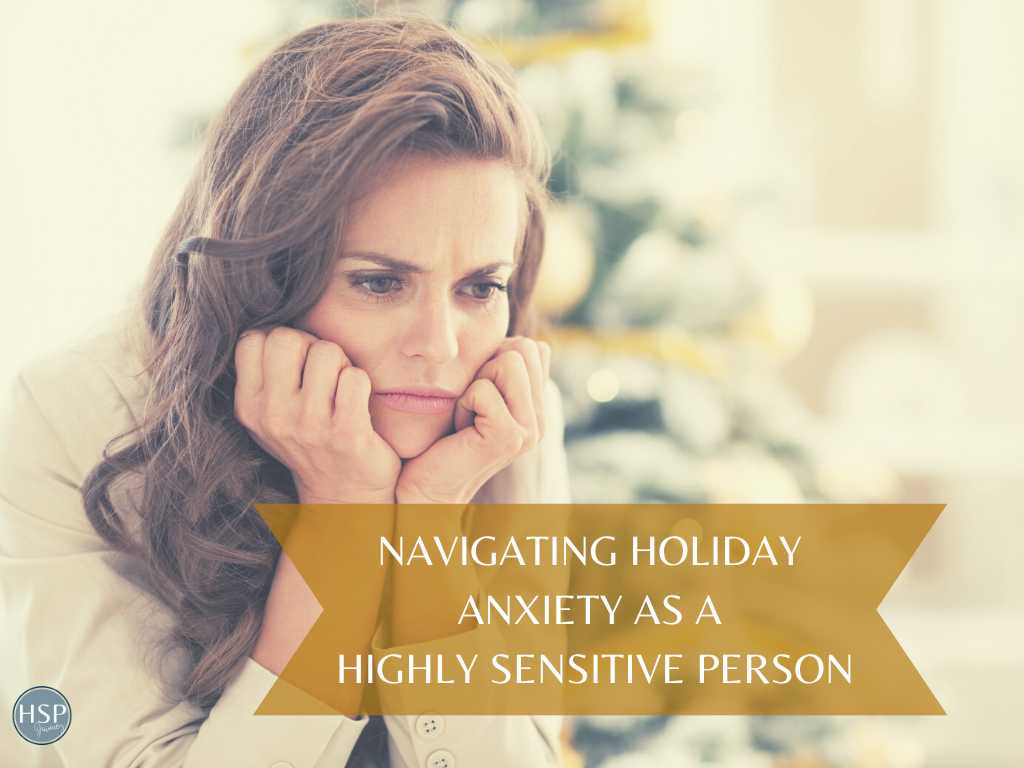The holiday season is a time for joy and togetherness, but for highly sensitive individuals, it can also bring about overwhelming anxiety and stress. As a highly sensitive person (HSP), you might find that the constant stimulation, socializing, and heightened emotional atmosphere take a toll on your mental well-being. Navigating holiday anxiety as a highly sensitive person is essential to ensure that you can enjoy the festivities while taking care of your emotional needs.
To help you manage holiday anxiety as an HSP, it’s important to recognize your triggers and develop strategies to cope with them. This may include setting boundaries, practicing self-care, and embracing your sensitivity as a strength. By acknowledging your needs and taking steps to protect your emotional well-being, you can navigate the holiday season with confidence and ease.

Table of Contents
#1 – Navigating Holiday Anxiety Around Gift Giving
Holidays can be a stressful time for highly sensitive people, especially when it comes to gift-giving. To help you navigate this overwhelming process, here are a few tips to consider:
Set realistic expectations: Remember that finding the perfect gift is not always possible or necessary. Your friends and family members will appreciate the thought behind your gifts, rather than focusing on the material object itself. If at all possible, communicate with your immediate family as well as extended family and friends to find out if they would like to stop gift-giving and have a get-together instead. Valuable connection time can often be better than a physical gift.
Plan ahead: To avoid added stress, start your gift shopping early. Keep a list of gift ideas for your loved ones, and allow yourself enough time to research and purchase them. Planning ahead can also help you with managing your financial expectations during the holiday season.
Choose meaningful gifts: As a highly sensitive person, you have a unique ability to tune into others’ emotions. Use this strength to select meaningful gifts that reflect the recipient’s personality, interests, or values. This can help alleviate some of the pressure of finding the “perfect” item.
Practice self-care: Don’t forget to take care of yourself during the holiday season, especially when tackling gift-giving tasks. Schedule time for relaxation, exercise, or any other self-care activity that helps you manage stress, and make sure you’re taking breaks while shopping or wrapping presents.
Consider alternatives to traditional gifts: Sometimes, material possessions may not truly express your feelings or communicate your relationship with the recipient. Think about offering experiences (such as tickets to a concert or a cooking class), homemade gifts (baked treats, artwork, etc.), or even the gift of your time (volunteering together or setting aside a special day to spend together).
By following these tips, you can make the gift-giving process a little less overwhelming and enjoy a happier, more fulfilling holiday season.
#2 – Navigating Holiday Anxiety Around Holiday Decorating
Holiday decorating can be both a source of joy and anxiety for sensitive people. The bright lights and cheerful sounds create a festive atmosphere that may also trigger your sensitivity. To help you navigate this season, consider the following tips tailored to your needs.
Prioritize your comfort: Before starting the decoration process, identify which elements of holiday decor affect you the most. If bright lights stimulate anxiety, look for softer lighting options like candles or dimmable LED lights. Focus on incorporating items that bring you peace and happiness.
Incorporate rest time: Decorating demands physical and mental effort. To avoid overwhelm, break the task into smaller steps, and schedule regular breaks. This allows you to recharge and maintain a sense of calm.
Limit exposure to anxiety-inducing elements: While it’s important to embrace traditions, you can make mindful modifications. If the sound of holiday music overwhelms you, consider turning it off or selecting quieter, instrumental versions.
Here’s a list of ideas to help you achieve a balance between holiday cheer and your sensitivity:
- Use natural materials like pinecones, wood, or fabric in your decor to evoke a sense of calm.
- Opt for smooth-textured ornaments to avoid irritation.
- Create a comfortable space with throws, cushions, and calming scents to retreat when feeling anxious.
- Designate a quiet area in your home, free from sensory overload.
By acknowledging your anxiety and sensitivity, you can tailor your holiday decorating experience to suit your needs. Embrace the aspects of the season that bring you joy while also taking care of yourself. Remember to prioritize your well-being and find ways to make the holidays enjoyable.
Looking for HSP Tools to Thrive in a Chaotic World?
The modern world is often overwhelming and stressful for those of us with sensitive nervous systems. Many of us have suffered from the challenges of high stress, anxiety, sensory overload, and mental health and physical health issues. Fortunately, after years of working with and researching Highly Sensitive People (HSPs), Julie Bjelland has developed many tools that have not only helped her but thousands of HSPs all over the world move out of survival mode living and into thriving. In this free webinar, she’ll share the tools that HSPs have found the most life-changing. Her goal is to help you live to your fullest potential because the world needs you.
Join this free webinar and get tools to help you thrive as an HSP!
#3 – Navigating Holiday Anxiety Around Holiday Entertaining
As a highly sensitive person, you might feel overwhelmed and anxious during holiday entertaining. Social events, parties, and family get-togethers can be challenging, but with a few strategies, you can manage your emotions and enjoy these gatherings.
First and foremost, set realistic expectations for yourself when attending gatherings. It’s natural to feel responsible for other people’s feelings but remember that you can’t control everything. Focus on enjoying the moment and allow yourself to take breaks if needed. Having realistic expectations can alleviate unnecessary pressure and stress.
Plan your self-care in advance to counteract overwhelm and anxiety. Schedule downtime before and after events to recharge. Additionally, practice deep breathing exercises or mindfulness techniques to help remain calm and centered during gatherings.
Here are some helpful tips for managing emotions during holiday entertaining:
- Create boundaries: Politely decline invitations if you feel they may be too overwhelming, or communicate your limits to hosts and guests.
- Prioritize events: Choose gatherings that resonate with you and align with your values, rather than attending every event.
- Prepare conversation topics: If small talk makes you anxious, have a few topics in mind to help you engage in meaningful conversations.
Lastly, don’t forget to give yourself permission to feel your emotions. Recognize that it’s normal for highly sensitive individuals to experience vivid emotions, both positive and negative. Embrace your sensitivity as a strength and take the time to practice self-compassion this holiday season.
#4 – Navigating Holiday Anxiety Around Attending Parties and Events
Attending holiday parties and social events can induce anxiety and a sense of overwhelm. However, with the right strategies in place, you can navigate these situations with confidence and ease. Here are some steps to help you manage your holiday anxiety:
- Set boundaries: It’s important to set boundaries for yourself when attending holiday events. This includes deciding how much time you’ll spend at the event, with whom you’ll interact, and what activities you will participate in. Establishing these rules in advance can help reduce your anxiety.
- Prepare mentally: Before attending a social event, take some time to mentally prepare yourself. This may include practices like deep breathing, meditation, or visualizing a positive outcome. Having a prepared mindset can significantly reduce your sensitivity and anxiety at the event.
- Plan for sensory overload: Highly sensitive individuals can experience sensory overload in crowded or noisy environments. Plan ahead by bringing noise-cancelling headphones or earplugs and consider choosing a location within the event that offers a quieter, less crowded space.
- Connect with a support person: Identify someone, such as a close friend or family member, who understands your sensitivity and can offer support during the event. Communicating with your support person prior to and during the event can help alleviate your anxiety.
- Practice self-compassion: Remember that it’s okay to feel overwhelmed or anxious. When these feelings arise, acknowledge them and practice self-compassion. Remind yourself that your feelings are valid and that it’s okay to prioritize your well-being.
By implementing these strategies, you can successfully navigate holiday parties and events while managing your anxiety and sensitivity.
#5 – Navigating Holiday Anxiety Around General Overwhelm
As a highly sensitive person, holiday overwhelm can be particularly challenging for you. The constant flurry of activities, social gatherings, and heightened emotions may take a toll on your energy levels. To successfully navigate through this period, it is essential to develop effective coping skills and prioritize self-reflection. Here are some practical strategies to help you manage holiday anxiety and maintain your well-being.
First, set realistic expectations for yourself during the holidays. You may be tempted to attend every event, complete your shopping list, and participate in every family tradition, but remember that it’s okay to say no. Prioritize your time and energy to focus on the activities that bring you joy and fulfillment. Establishing boundaries can help you prevent unnecessary stress and burnout.
Second, practice self-reflection to identify your emotional triggers. By understanding your stressors, you can proactively address them before they weigh you down. Consider journaling your thoughts and feelings or engaging in mindful activities, such as meditation or deep breathing exercises. This will not only improve your self-awareness but also enhance your emotional resilience.
Third, develop a toolbox of coping strategies that suit your needs as a highly sensitive person. Some useful methods may include:
- Physical activities: Walking, yoga, or dancing can release endorphins and help reduce stress.
- Creative outlets: Drawing, painting, or writing allows for emotional expression and release.
- Social support: Connecting with like-minded people who understand your sensitivity can provide a sense of belonging and validation.
Fourth, give yourself permission to take recovery days after particularly intense or busy events. These days can be essential for replenishing your energy levels and ensuring overall well-being. Create a comfortable and calming environment, engaging in activities that soothe your senses, such as reading a book, listening to soft music, or taking a warm bath.
Remember, the holidays are meant to be enjoyed. By taking the necessary steps to manage your overwhelm, you can confidently navigate through the festive season as a highly sensitive person.
#6 – Navigating Holiday Anxiety Around Rushing and Too Much to Do in a Short Amount of Time
Acknowledge your feelings: It’s normal to feel overwhelmed when faced with numerous tasks and expectations during the holiday season. Recognize your fear, anxiety, and worry around rushing and having too much to do. By identifying these emotions, you’ll be better equipped to manage them.
Set realistic expectations: Keep in mind that striving for perfection might lead to disappointment and burnout. Prioritize the events and tasks that truly matter to you, and remember that it’s okay to say no to some commitments. Adjust your expectations and focus on what’s achievable in the given timeframe.
Create a schedule: Proper planning helps alleviate anxiety around managing tasks and events. List down all the necessary tasks, and allocate time to complete each by creating a timetable. A structured schedule enables you to stay organized and maintain control over your time.
| Task | Time Allocation |
|---|---|
| Gift Shopping | 2 Hours |
| Meal Preparation | 3 Hours |
| Decorating the House | 1 Hour |
Avoid overcommitting: Juggling too many tasks or events can lead to burnout and even more anxiety. Assess your capacity and be honest with yourself about what you can manage. It’s essential to prioritize self-care and allocate time for relaxation. Don’t hesitate to delegate tasks or ask for help when needed.
Implement effective strategies: Apply coping strategies for managing stress and anxiety, such as mindfulness, deep breathing, or physical activity. These techniques can be helpful in calming your nerves and maintaining emotional balance amidst the holiday hustle and bustle.
Remember that navigating holiday anxiety, especially as a Highly Sensitive Person, requires patience, acceptance, and self-compassion. By employing practical tools and strategies, you can manage your time and emotions effectively during this busy season.
Frequently Asked Questions
How can an HSP manage holiday stress effectively?
As a highly sensitive person (HSP), it’s essential to manage holiday stress proactively. Establishing boundaries and setting realistic expectations can help. Prioritize your well-being by reducing the number of events you attend, taking breaks during gatherings, and opting for activities that bring you joy and relaxation. For more tips on handling holiday stress, visit this Navigating the Holidays as an HSP article.
What are some coping strategies during family gatherings?
Coping strategies during family gatherings include practicing deep breathing, finding a quiet space to retreat, and talking to someone who understands your needs. Spend time with close friends and family members who can provide comfort, and don’t hesitate to excuse yourself for breaks when needed. Here is a great Holiday Survival Guide for the Highly Sensitive Person with additional recommendations.
How can HSPs balance socializing and self-care during holidays?
Balancing socializing and self-care involves knowing your limits and communicating them effectively. Ensure you have some alone time to recharge and make time for activities that nourish your soul. Don’t hesitate to say no to invitations or skip events that may be too overwhelming. For more advice on maintaining balance, read this article on avoiding holiday overwhelm.
What types of holiday events should HSPs avoid?
HSPs should generally avoid events that involve large crowds, excessive noise, bright lights, or extreme sensory stimulation. Examples include packed parties, chaotic shopping centers, and activities with an overly competitive atmosphere. Instead, opt for smaller gatherings or celebrations that can provide a more comfortable environment for HSPs.
How can HSPs communicate their needs to loved ones?
To communicate your needs to loved ones, be honest and assertive about your feelings and preferences. Share your limits with those close to you and kindly communicate how they can support you during the holidays. For a deeper understanding of the Highly Sensitive Person’s traits, check out this article.
What self-soothing techniques can help HSPs handle holiday anxiety?
Self-soothing techniques for HSPs include deep breathing exercises, progressive muscle relaxation, grounding techniques, and mindfulness meditation. Engaging in hobbies you enjoy, such as reading, art, or journaling, can also help alleviate holiday anxiety. Remember to get sufficient sleep, maintain a healthy diet, and exercise regularly to support your overall mental and emotional wellness.
Be sensitive, be free
*This post contains affiliate links and I will be compensated if you make a purchase after clicking on my links*





[…] are three more Highly Sensitive Person (HSP) […]